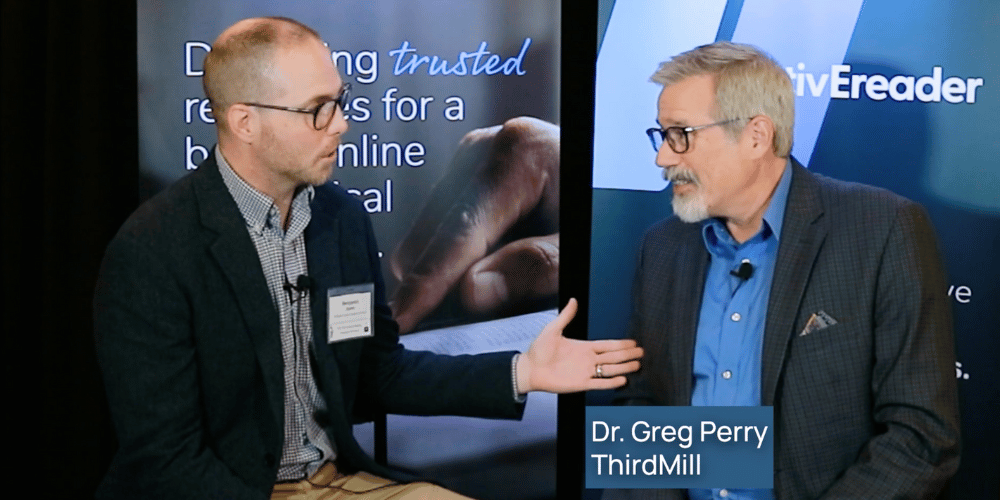The following is adapted from a recorded interview between Dr. Benjamin Quinn, BibleMesh Director of Partnerships and Dr. Greg Perry, Vice President of Strategic Partnerships at Third Millennium Ministries (Thirdmill).

For years, Thirdmill has leveraged technology for the sake of theological education. How do we leverage technological advancement with institutional expertise and development in mind?
Throughout history, communication technology has always been important for the spread of the Gospel, whether we think about the printing press at the time of the Reformation or the advance of television and how important that’s been.
Digital technology allows us to go to every place in the world where someone has a mobile phone. That’s an amazing opportunity not only to bring the gospel, but also to bring leadership training to different areas.
The church is growing the fastest where there’s least access for theological training. If we’re going to have a healthy church, then we must utilize technology to bring theological training to our brothers and sisters. We must not just teach them, but learn with them about their context, because they’re the experts in their context. What we can bring is the apostolic faith in a reflective way over the history of the church.
How might the criticisms of online education that say it neglects community-based learning or practical support be addressed by how Thirdmill and BibleMesh approach online theological education?
Thirdmill is a curriculum and training provider, as is BibleMesh. Both organizations realize the limits of online theological training and for that reason aim to offer a model in which students don’t just learn on their own. They have real people supporting them actively through every part of the learning process.
We aim to keep students connected to real-world ministry contexts. For this reason, our organizations pursue partnerships with indigenous churches and mission agencies on the ground, because in the end our calling is all about fulfilling the Great Commission.
Additionally, this is where partnerships really come into play. We aim to keep students connected to real-world ministry contexts. For this reason, our organizations pursue partnerships with indigenous churches and mission agencies on the ground, because in the end our calling is all about fulfilling the Great Commission. We can only accomplish this by working together.
Our brothers and sisters on the ground have the relationships with church leaders there. They can pray with them. They are the experts in contextualization, because they know their culture. Institutional partnerships with indigenous churches and curriculum providers are a wonderful opportunity for training leaders throughout the world who can take the gospel further than any of us ever could.
How should institutions and organizations think about contextualizing the Christian faith to various cultures around the world?
It is vitally important to not only deliver teaching, but also to gather teaching from others. At places throughout the world where people are gathering, we can provide opportunities for the global church to teach us, as well as opportunities to learn about the Christian faith with the global church.
It is vitally important to not only deliver teaching, but also to gather teaching from others.
In our vision, it’s not just western Christians sitting at the curriculum table, it’s Christians from China and other parts of Asia and Latin America working together to learn from one another. We come together because the apostolic faith has always been intercultural from the time of Pentecost. Christianity has always been a global religion.
That’s why the apostolic faith is so important and why local flavors are so important as well. The partnership with indigenous believers is a two-way street, not a one-way street.
What is on the horizon for this intersection of technological use and development in indigenous locations?
On the field now there has been a shift from a focus on curriculum development to focus on training and building an infrastructure of support. How can Thirdmill provide the joints of that partnership connection that are sustainable? What we are learning is that in different parts of the world, global economies do not support volunteerism like it is supported here in the West. A question we must answer is how to provide and support training that indigenous leaders can supervise and provide the time needed for it.
How have the BibleMesh Institute and Thirdmill partnered together to make theological education accessible in this way to people across the globe?
BibleMesh and Thirdmill have worked with Southeastern Seminary to develop a partnership strategy that utilizes Thirdmill curriculum. Eight courses in the Thirdmill Certificate Track are completed with BibleMesh, and then students transfer Southeastern Seminary to work towards the completion of a Master of Arts in Christian Studies degree.
BibleMesh has sought to lower the barrier of entry in theological education, especially for people in the global south. Being able to partner with Thirdmill’s curriculum and expertise, and then have those courses transfer to Southeastern Seminary is one of the ways we have tried to accomplish that goal.
This approach not only provides an affordable high-quality option for theological training, but it also provides an opportunity for people who are on the field doing mission work who don’t want to leave the context. They can keep learning on the field and apply what they’re learning right away.
BibleMesh and Third Millennium Ministries are thrilled to partner in a shared vision to provide trusted theological education to anybody who wants to serve the church. Every Christian deserves a well-trained pastor. We are excited to be able to bring these two visions together and deliver them in these learning pathways.
The Thirdmill Certificate delivered by the BibleMesh Institute is an 8 course, 24 credit-hr certificate that is transferable to certain BibleMesh partner schools. This Certificate is custom designed for the Master of Arts in Christian Studies at Southeastern Baptist Theological Seminary.
Interested in this degree pathway?
